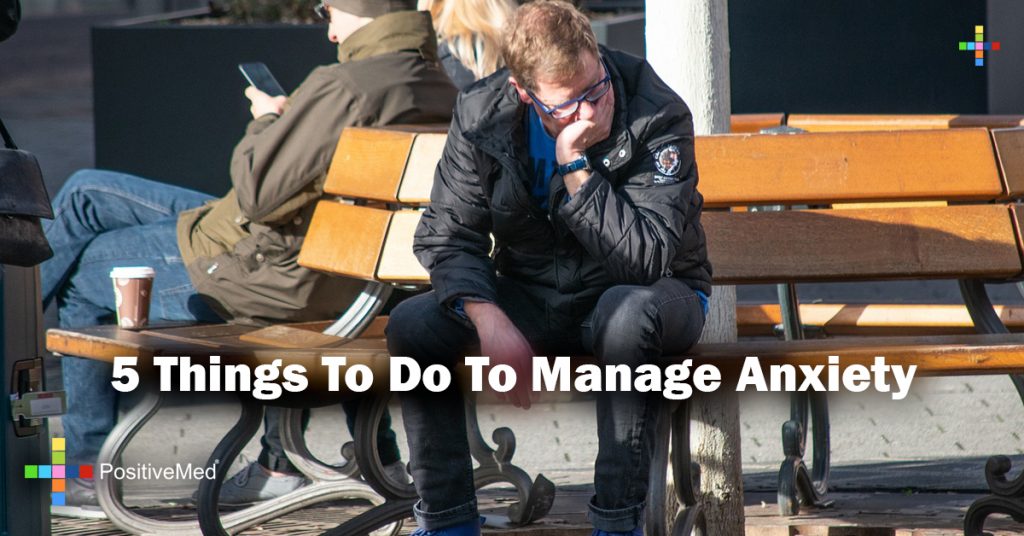
Spanish Version: 5 Cosas Que Hacer Para Manejar La Ansiedad
I am a counselor in private practice and it has become a rare day that someone doesn’t tell me how anxious they are. In my own life, I have known anxiety, that feeling in the pit of the stomach that seems to be so unbearable. In fact, anxiety has become the most common mental illness, affecting over 40 million people in the US alone, according to the Anxiety and Depression Association of America . The good news is that there are treatment and relief for anxiety and here are some helpful ideas to try when anxiety is high.

1 – Breathe
. One of the first things that happen in a high anxiety state is that our breath becomes very shallow and quick. Biologically this looks and feels like a fight or flight response, and the shallow breathing actually sustains the physical feeling of anxiety. Slowing your breath, and taking it deep into your belly, can reverse the heightened physiological response and bring a sense of peace and calm. Here’s a breathing exercise you can use: Breath in for a count of 1, 2, 3, 4 and then breathe out for a count of 4, 3, 2, 1. Place your hand on your belly and let that hand move up and down with your breath during the exercise. Focus on inhaling your breath deep into your belly (you’ll feel your hand rise and fall) and on the counting. The breathing slows down the physical response to the anxiety, and the counting helps slow down the racing thoughts. It sounds simple, but it can be quite difficult and requires some practice. If / when you find yourself getting off track, gently begin again.
2 – Ground Yourself
. Anxiety lives in the future and the fear of all the possible things that could go wrong. Grounding ourselves back to the present moment is a great way to pull us out of that anxious future and into our body. You can do this with a quick 5 senses exercise. Be very specific and include as much detail as possible. Look around and identify all the things you can see. What colors are there? What furniture is there? What are the titles on the books or magazines nearby? Next, identify all the things you can feel. Where are your feet, your back, your hands? What muscles are tight or relaxed? Can you feel your hair on your neck or forehead? Focus on your taste. Is there a taste that is lingering in your mouth? Move on to your sense of smell. What can you smell right now? Is there food cooking? Perfume in the air? Really breathe deeply and identify as many scents as you can. Lastly, close your eyes and focus on your hearing. How many different sounds can you distinguish? Listen for birds, air conditioners, people talking, doors closing, footsteps, or any other sounds that might be passing by. Take a deep breath and enjoy being back in the present moment.
3 – Distract yourself
. Sometimes the quickest way to manage high anxiety is to distract ourselves for a little while. This isn’t a long-term fix but can be powerful at the moment to decrease symptoms. What are the healthy things you enjoy doing? You can go for a walk, put on your favorite tunes, read a book, look at photographs that make you smile, play with your pet, or start a new project. The goal here is to move our mind and sustaining anxious thoughts into something more pleasant and calming.
4 – Reach out for support
. Cultivate a list of people you can reach out to when anxiety is high. Have their numbers stored in a special place and call them when you need some help. Gathering with your support system via phone, online, or in person can help us remember we are not alone and others really do care. No one gets through life all on their own, and it is a sign of strength to reach out when we need help.
5 – Journal
. The act of writing about how we are feeling activates other areas of the brain and helps to get us out of the fight or flight response. One possible exercise is to name as many emotions under the anxiety as you can. Focusing on what else may be present in addition to and besides just anxiety uses more of the whole brain. Let your feelings and thoughts flow onto the paper and allow the more rational thought areas of the brain to kick into high gear and begin to center you.
Anxiety can feel overwhelming. By taking the small steps outlined in the above suggestions, you can begin to manage and cope with your anxiety. Most of these steps will contribute to a healthier and more fulfilling life overall. If you are suffering from symptoms on a regular basis, please reach out for help. I highly recommend getting counseling to address the underlying causes for what continues to feed your distress. The good news is that anxiety continues to be very treatable and there is hope for relief.
Rosemary S Clark, LMFT, LPC, NCC
110 Traders Cross, Suite 101
Bluffton, SC 29909
[email protected]
843-564-8275
 Rosemary Clark, LMFT, LPC is a counselor, relationship expert and life coach in Bluffton, SC. She is passionate about living the best life we can and works to spread a message of empowerment for all. She shares the daily love and regular blogs on her website provide in-depth workshops and offers traditional and distance counseling/life coaching. In addition, Rosemary runs a practice called Whole Health, where the focus is on holistic engagement with you for achieving the life you desire.
Rosemary Clark, LMFT, LPC is a counselor, relationship expert and life coach in Bluffton, SC. She is passionate about living the best life we can and works to spread a message of empowerment for all. She shares the daily love and regular blogs on her website provide in-depth workshops and offers traditional and distance counseling/life coaching. In addition, Rosemary runs a practice called Whole Health, where the focus is on holistic engagement with you for achieving the life you desire.
You can find out more about Rosemary on her website , Facebook , Twitter , or Instagram .







